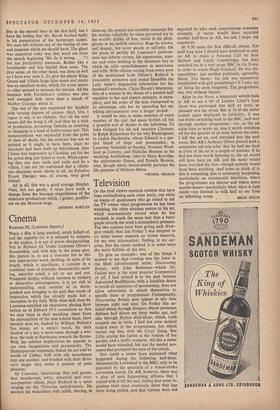Television
OF the rival viewer-research systems that have been contradicting each other lately, one relies on teams of questioners who go round to ask the TV owner what programmes he has been watching; the other attaches meters to his set, which automatically record what he has watched, in much the same way that a baro- graph records the week's atmospheric pressure. The two systems have been giving such diver- gent results that last Friday I was tempted to try some viewer research on viewer research, for my own information : finding, to my sur- prise, that the meter method is in some ways the more fallible of the two.
To give an example: one of the things I wanted to see that evening was the latest in the Shell advertisement series, Discovering Britain, with John Betjeman—which Dr. Gallup says is the most popular Commercial of all. I had missed it in the past because Associated Rediffusion, with a laudable desire to avoid all suspicion of sponsorship, does not allow advertisers to attach themselves to specific times or programmes. Consequently, Discovering Britain may appear at any time between eight and nine. On Friday this en- tailed sitting through Dragnet, whose persistent dullness had driven me away weeks ago, and also through Hylton Half-Hour, which, truth compels me to state, I had not even noticed tucked away in the programmes, but which turned out fine, with the Crazy Gang, Bea Lillie among the fairies at, the bottom of her garden, and a crafty conjuror. All this a meter would have recorded, but not the mental pro- cesses that prompted the turn of the switch.
Nor could a meter have explained what happened during the following half-hour. Momentarily I switched to the BBC, only to be punished by the spectacle of a breast-stroke swimming match. On AR, however, there was a play of such hypnotising silliness that I stayed with it till the end, feeling that some in- genious twist must eventually show that legs were being pulled, and that viewers were not expected to take such preposterous nonsense seriously. A meter would have recorded another half-hour to AR, but not, I hope, my comments.
At 9.30 came the first difficult choice. For auld lang syne I should have preferred to stay on AR to make a Personal Call on Jack Hulbert and Cicely Courtneidge, but duty switched me to a very prosy BBC In the News, in order to watch Hugh Gaitskell. He was dis- appointing: just another politician, agreeable, fluent. Too fluent : his talk was excessively interlarded with glib parentheses ('if I may say so' being the most frequent). The programme, too, was without impact.
After In the News, a temporary switch-back to AR to see a bit of Laurier Lister's Late Show was prolonged into half an hour, so pleasant was the revue. But at 10.30 the meter system again displayed its fallibility. It was not worth switching back to the BBC, half-way through another programme : nor, as the set takes time to warm up, was it worth switching off for the quarter of an hour before the news. I left the set on, and retreated into the next room. But AR's Anthony Oliver proved such a competent tall-tale-teller that he had me back in front of the set in a couple of minutes. If he had not been worth listening to, the set would still have been on AR, and the meter would have recorded the fact—though nobody would have been watching. And come to think of it, this is something that is constantly happening, particularly on commercial television, where the programmes are shorter and where many quarter-hours—particularly when there is light music—are listened to with half an ear from an adjoining room.
BRIAN INGLIS


































 Previous page
Previous page